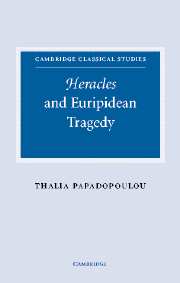1 - Ritual and violence
Published online by Cambridge University Press: 22 September 2009
Summary
Introduction
In the previous section I showed how the literary tradition from Homer onwards provides conflicting views about the mythological figure of Heracles. In particular, I pointed out that what seems to be constantly brought to the fore is a sense of an extreme ambivalence concerning the nature of Heracles' arete, ‘virtue’ or ‘excellence’. On the one hand he is portrayed as the invincible hero and civilizer of mankind, an exemplar of virtue; on the other hand he is presented as the megalomaniac and hubristic conqueror, a representative of excess. In this chapter I will argue that Euripides exploits the dynamics of this ambivalence for his own dramatic purposes. What is missing in previous approaches to Heracles is an understanding of the central role of Heracles' ambivalence. The question is not whether Heracles is innocent or hubristic; what matters is the interplay between his virtue and his excess. The use of ritual in the play makes a good starting point, particularly as the onset of Heracles' madness is set in a sacrificial context.
Ritual and ambivalence
In Heracles ritual has an ever-present and multi-dimensional role: supplication, makarismos, victory-song, hero-cult, all have their place in this tragedy. But the aspect which dominates, and which acquires the major function to the point of becoming, arguably, the subject of the play, is that of purification by means of sacrifice; in this respect, the dramatic action culminates in the event which determines everything else and around which everything else revolves, i.e. the catastrophic perversion of a purificatory sacrificial procedure, which results in a series of ‘sacrificial’ deaths.
- Type
- Chapter
- Information
- Heracles and Euripidean Tragedy , pp. 9 - 57Publisher: Cambridge University PressPrint publication year: 2005

